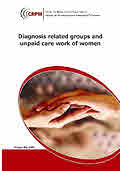Gender aware policy appraisal: Diagnosis related groups and unpaid care work of women
Gender aware policy appraisal: Diagnosis related groups and unpaid care work of women
Author(s): Marija Risteska, Sanja Kostovska, Natalija Spasovska, Bashkim Bakiu, Ana Mickovska-Raleva, Andrej Pulejkov
Subject(s): Gender Studies, National Economy, Economic policy, Welfare systems
Published by: Центар за истражување и креирање политики
Keywords: Gender roles; Unpaid Care Work; Gender responsive budget;
Summary/Abstract: This document is the first gender aware policy appraisal prepared in Macedonia. It provides assessment of the implications of Diagnosis Related Groups (hereinafter: DRGs), policy measure introduced as payment tool at hospital level health care, on various groups of women and men (urban, rural and those belonging to an ethnic minority).
The working hypothesis of this research and analysis was that the introduction of the DRG measure will inevitably decrease the length of stay in Macedonian hospitals / clinics and that the recovery and therefore care work for the ill will transfer from the public sphere (hospitals) to the private sphere (households). This will eventually create savings for the public health system and will increase the unpaid care work performed in Macedonian households.
The research team has developed several research tools to depict who is affected by the shift emerging with the introduction of DRGs: times use survey of case study families who have ill family member discharged from DRG implementing hospital; nation-wide survey for care work including care for the ill; desktop review of legislative and policy framework of the health sector, the DRG system and unpaid work were employed in this study.
The evidence gathered through this research show that indeed with the introduction of the DRG payment system at hospital level health care, the average length of stay of patients in hospitals decreases. The study offers sound estimates of the savings of the health system that are up to 34% of the Ministry of Health’s budget per year by using the DRG payment tool. What is more importantly this
study proves the hypothesis that there is a link between the DRG system and unpaid care work as it shows that the care work as part of the domestic work increases once the system is used, even not in full capacity. The results of both times use survey and nation-wide survey of care work demonstrate that the burden of care work is disproportionately shared among female and male family members.
Women spend 51% more time on unpaid care work for the ill family members than men (6 hours during weekends as compared to 3 hours for men). This work does not contribute to the country’s GDP though the study estimates that it values as equivalent to the part time salary of a nurse.
The burden of care work taken by women has an effect on their professional and personal life. Women tend to decrease their working hours and therefore earn less in their formal employment, or even quit jobs; they have less time for themselves and for their children in particular.
As a result of the analysis presented in this study we can conclude that the DRG policy measure is a budgetary tool that is not gender neutral. It creates significant gender inequality and will not contribute to the much needed change of patriarchal attitudes and deep-rooted stereotypes regarding the roles and responsibilities of women and men in the family and Macedonian society.
Therefore, this study provides several practical and evidence based policy recommendations that will ease the implementation of the DRG policy measure and achieve the genuine objectives of hospital efficiency and effectiveness; but will also neutralize the gender implications the DRG system will have with the shift of care work from the hospitals to the homes of the patients.
- Page Count: 73
- Publication Year: 2008
- Language: English
- Content File-PDF

